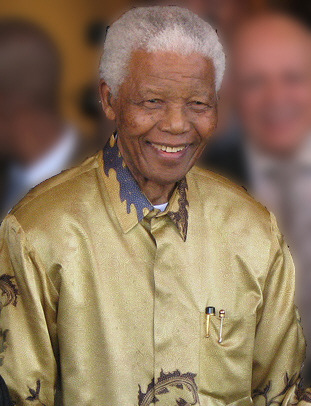Nelson Mandela dies at age 95

On Dec. 5, Nelson Mandela, a political activist and public figure in South Africa, passed away at age 95. Known for being the first black president of a democratic South Africa, Mandela spent much of his life advocating against and eventually helping to end apartheid.
“When I first heard about his death, I just couldn’t believe it; I got a little teary eyed,” said humanities English teacher Diana McGrath. “I’ve been teaching my class about apartheid, and about Mandela in extension, since 2007 when I began giving out Kaffir Boy, so my students also knew what hardships he went through for his country,” McGrath said.
Nelson had been in political activism in South Africa since 1952 as part of the African National Party. He was arrested in 1962 on counts of treason and was sentenced to life in prison until 1990, when the South African government released him due to civil issues.
“When the South African government declare that apartheid would be removed and Mandela released, there was hope that things could change in the world,” said humanities history teacher Chris Davis. Upon Mandela’s release, Mandela toured the U.S. to spread the word of apartheid and of the historic changes in South Africa— a tour which Davis was able to see in Los Angeles at the Memorial Coliseum. “He went on tour in 1990, shortly after he was released; back then I was only a student teacher, so to be able to hear someone of his historic significance was a big deal,” Davis said.
After his release from prison, Mandela ran for president in South Africa in 1994. Mandela continued to advocate for repair after apartheid and for removal of mutual tension between the whites and blacks in South Africa.
Mandela left his seat in office in 1999, but he continued his activism until 2004, when he announced his true retirement amid his failing health. “I knew that he would die soon with his bad health condition and all, but it was still a big deal when he died,” Davis said.
Mandela’s life and activism have been considered crucial to South Africa’s development and ethical progress. “Nelson Mandela was a very important figure in both politics and ethics,” said junior Connor Clark. “I remember learning about who Mandela was and how he helped to abolish apartheid and liberate the people of South Africa, so I truly think that it was a sad day for many people who were affected by him, directly or not,” Clark said.
A series of memorials will occur in the ten days of mourning for Mandela, which began on Dec. 6 and will be attended by Mandela’s family and people of political interest like Pope Francis and Barack Obama, as well as millions of South Africans grateful of all Mandela had done.







